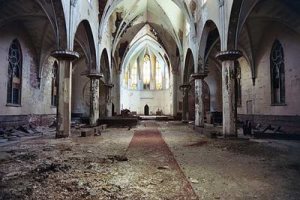The Sad Legacy of Theological Liberalism

August 18, 2009

From Banner of Truth:
'How Liberal Theology Infected Scotland' is a deeply instructive short article written by R. A. Finlayson, the late professor of Systematic Theology in the Free Church College in Edinburgh.Read the rest of this important article HERE.
Finlayson attributed the nineteenth century infiltration of Liberalism into a confessional Church to wrong priorities by the leaders. He wrote:
...not content with opening three colleges, in Glasgow, Edinburgh and Aberdeen...her theological students would not deem their course complete, or their standing in the Church assured, without a postgraduate course of one or more years in one of the more famous Colleges in Germany.
From that folly, the product of spiritual pride, the Free Church was to reap a bitter harvest. Germany then was the nursery of Liberal theology, which was spreading like prairie fire through the Protestant Churches of Europe.
Reading this assessment reminded me of the words of Archibald Alexander to the young Charles Hodge. Hodge has been given leave by the Seminary to spend two years studying in Europe. As well as developing his linguistic skills, Hodge would become acquainted with biblical criticism. Alexander cautioned him:
Remember that you breathe a poisoned atmosphere. If you lose the lively and deep impression of Divine truth, if you fall into scepticism or even into coldness - you will lose more than you gain from all the German professors and libraries . . .
At the start of the twentieth century a similar situation was faced by the young Gresham Machen as he studied in Marburg, Germany, under the renowned Liberal scholar Wilhelm Herrmann. Machen said that Herrmann believed hardly anything essential to Christianity. Yet here was a man who at the same time exuded an incredibly impressive piety. Although he rarely spoke of the profound spiritual struggle that he went through in Germany, one of Machen's students recalled him saying that:
. . . the great Dr. Herrman presented his position with such power I would sometimes leave his presence wondering how I could ever retain my confidence in the historical accuracy of the Gospel narratives. Then I'd go to my room, take out the Gospel of Mark and read it from beginning to end in one sitting - and my doubts would fade. I realized that the document could not possibly be the invention of the mind of a mere man.
It was a remarkable act of mercy that kept the young Charles Hodge, and the young Gresham Machen, from capitulating to the errors of their teachers. Embracing orthodoxy, and remaining orthodox, cannot ultimately be attributed to our own powers. How different would the history of Princeton have been if the poison of Liberalism had infected the blood stream of Charles Hodge. Perhaps we can see what it would have looked like by observing the influence of a notable Hebrew scholar on the other side of the Atlantic.
It ought to be kept in mind that, more often than not, theological teachers who embrace errors remain convinced that they are still orthodox. In Scotland, A. B. Davidson, who was appointed in 1863 to the Chair of Hebrew Old Testament Literature in the New College, Edinburgh, had drunk deeply at the wells of German Liberal theology. He subtly began to introduce the new theology. Finlayson notes that Davidson gave this counsel to his students:
Be careful to give this to your congregations in small doses.
A. B. Bruce, professor at the Glasgow College, is a further tragic
example of the deleterious effects of Liberal theology:
Of some others in the forefront of the movement, it can only be said that there was a breakdown in character as well as in faith, over which the veil of charity must be drawn. As sad a case as any was, perhaps, that of A. B. Bruce, because of the early promise of his work on the teaching of Christ; and yet at the end of the day one of his closest friends commented sorrowfully: 'Sandy Bruce died without a single Christian conviction.'




